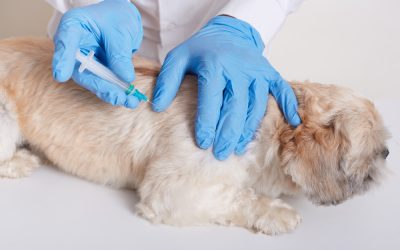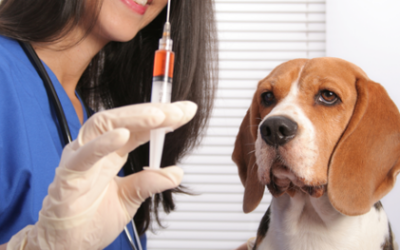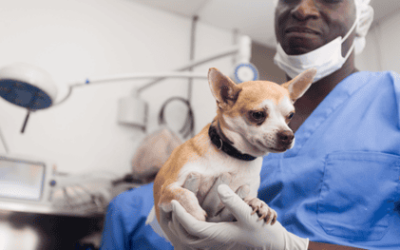Dog Anxiety Cause, Symptoms, and Treatment Options

What is Dog Anxiety?
Dog anxiety is a common condition that affects many canines, causing them to experience intense feelings of fear, stress, and unease. This can manifest in a variety of physical and behavioral symptoms and can significantly impact a dog’s quality of life. Understanding the causes and symptoms of dog anxiety is the first step in helping your furry friend find relief.
Causes of Dog Anxiety
Socialization and Early Life Experiences
A dog’s early life experiences can play a significant role in the development of anxiety. Puppies that are not properly socialized or are exposed to traumatic events during their formative years may be more prone to developing anxiety disorders later in life.
Fear of Loud Noises
Many dogs are frightened by loud noises like thunderstorms, fireworks, or even household appliances. This can trigger a stress response and lead to anxiety.
Separation Anxiety
Some dogs become anxious when left alone, fearing their owners will not return. This can result in destructive behaviors, excessive vocalization, and other distressing symptoms.
Aging and Cognitive Dysfunction
As dogs age, they may develop cognitive impairments that can contribute to increased anxiety. This is often seen in senior dogs with conditions like canine cognitive dysfunction syndrome.
Symptoms of Dog Anxiety
Physical Symptoms
- Panting
- Trembling
- Restlessness
- Excessive drooling
- Loss of appetite
- Digestive issues
Behavioral Symptoms
- Destructive behaviors, such as chewing or scratching
- Excessive barking or whining
- Hiding or avoiding certain situations
- Urinating or defecating in the home
- Excessive grooming or licking
Anxiety Triggers
Identifying the specific triggers that cause your dog’s anxiety is an important step in developing an effective treatment plan. Some common anxiety triggers include:
- Loud noises (thunderstorms, fireworks, etc.)
- Separation from owners
- Unfamiliar environments or situations
- Interactions with strangers or other animals
- Changes in routine or household dynamics
Treatment Options for Dog Anxiety
Behavioral Training
Behavior modification techniques, such as desensitization and counter-conditioning, can be highly effective in helping dogs overcome their anxiety. A qualified animal behaviorist or certified trainer can work with you and your dog to develop a customized training plan.
Medications
In some cases, veterinary-prescribed medications may be necessary to help manage a dog’s anxiety. These can include anti-anxiety drugs, antidepressants, or other psychoactive medications.
Natural Remedies for Soothing Dog Anxiety
For dog owners seeking a more holistic approach, several natural remedies can help soothe anxiety in dogs. These include:
Calming Supplements: Supplements containing ingredients like chamomile, valerian root, or melatonin can help promote relaxation and reduce anxiety symptoms.
Essential Oils: Certain essential oils, such as lavender, have been found to have a calming effect on dogs when used properly and with caution.
Pheromone Diffusers or Sprays: Products that release synthetic pheromones can help anxious dogs feel secure and comfortable.
Compression Vests or Wraps: These snug-fitting garments can have a calming effect, providing a gentle pressure that helps ease anxiety.
Calming Music or Sounds: Soothing music or nature sounds can help mask environmental triggers and create a more relaxing environment for your dog.
It’s important to consult with your veterinarian before incorporating any natural remedies into your dog’s care plan, as some may interact with medications or have potential side effects.

Medication Options for Managing Dog Anxiety
In some cases, medication may be necessary to manage dog anxiety effectively. Veterinarians may prescribe anti-anxiety medications, such as selective serotonin reuptake inhibitors (SSRIs) or benzodiazepines, to help alleviate symptoms. These medications work by targeting the neurochemical imbalances that contribute to anxiety. It’s crucial to work closely with your veterinarian to determine the appropriate medication and dosage for your dog and monitor any potential side effects.
The Role of Exercise in Reducing Dog Anxiety
Regular physical activity can play a significant role in managing dog anxiety. Exercise helps to release pent-up energy, promote the production of feel-good hormones, and provide a healthy outlet for stress. Engaging your dog in activities like walks, playtime, or structured training can help them cope with anxiety-provoking situations better. However, it’s important to find the right balance, as excessive exercise can also contribute to increased anxiety in some cases.
Treating Separation Anxiety in Dogs
Separation anxiety is common in dogs, often manifesting when the pet is left alone or separated from their primary caregiver. Symptoms may include excessive vocalization, destructive behaviors, or even house-training accidents. To address separation anxiety, consider implementing strategies such as gradual desensitization, providing enrichment activities, and using calming aids like pheromone diffusers or anxiety wraps. In severe cases, medication prescribed by a veterinarian may be necessary to help manage the anxiety.
Establishing a peaceful, predictable environment can greatly benefit an anxious dog. This may involve minimizing sudden noises or changes in the home, providing a consistent daily routine, and creating a designated “safe space” where your dog can retreat when feeling overwhelmed. Incorporating calming scents, such as lavender or chamomile, and playing soothing music can also help create a more relaxing atmosphere.
How to Calm an Anxious Dog: Tips and Techniques
In addition to natural remedies and medication, there are various techniques you can employ to help calm an anxious dog. These include:
Provide a Safe Space: Create a cozy, quiet area in your home where your dog can retreat when feeling overwhelmed.
Use Calming Signals: Speak soothingly, offer gentle petting, or use positive reinforcement to help your dog feel more at ease.
Distract and Redirect: Engage your dog in favorite activities or toys to shift their focus away from the source of anxiety.
Practice Desensitization: Gradually expose your dog to anxiety-provoking situations in a controlled environment to help them learn to cope.
Encourage Exercise: Regular physical activity can help release pent-up energy and promote relaxation.
When to Seek Professional Help for Your Dog’s Anxiety
If your dog’s anxiety is severe, persistent, or interferes with their daily life, it’s important to seek the guidance of a veterinarian or animal behaviorist. They can provide a comprehensive assessment, rule out any underlying medical conditions, and develop a customized treatment plan to help your furry friend find relief.
How Can Pet Insurance Help You In this Situation?
Pet insurance can be a valuable resource for managing your dog’s anxiety. Many plans cover the cost of veterinary visits, behavioral training, and even certain medications or supplements. This can help alleviate the financial burden and ensure that your dog receives the care it needs.
How Can Pet Insurance Help You In this Situation?
Pet insurance can be a valuable tool in managing the costs of veterinary expenses. By having a pet insurance policy in place, you can have peace of mind knowing that you can provide medical care for your furry companion without worrying about the financial burden. Pet insurance can help cover the costs of veterinary consultations, diagnostic tests, medications, and even specialized treatments if required.
Reimbursement
This method is the most common for pet insurance companies. You pay out of pocket for the veterinarian bill, and then the insurance company reimburses you for what’s covered under the insurance plan. The steps look like this.
- You pay the vet bill after your dog’s visit.
- You fill out the pet insurance claim form.
- Submit the claim form and other required documentation to the insurer.
- After the claim is approved, you will be reimbursed for eligible expenses.
What Does Odie Pet Insurance Cover?
Pet insurance covers various veterinary expenses, providing financial protection and peace of mind for pet owners. Here are the details of the coverage options offered by Odie Pet Insurance:
Illness & Injury Plan
The Illness & Injury Plan is an all-inclusive insurance plan designed to cover a wide range of medical needs for your pet. This plan includes comprehensive coverage for various illnesses, injuries, and veterinary services. Some of the covered items include:
- Veterinary exams and consultations
- Diagnostics (e.g., X-rays, lab tests)
- Prescribed medications
- Surgeries and hospitalization
- Rehabilitation, acupuncture, or chiropractic treatments
- Medically necessary supplies
- Euthanasia and cremation
The Wellness Plan
The Wellness Plan is a monthly membership that focuses on preventive care and covers routine veterinary services.
- Provides reimbursements for routine care items such as wellness visits (exams and vaccines), testing and parasite prevention, dental cleanings and at-home dental care, vitamins, supplements, and more
- Through Odie’s partnership with Petivity, a leader in smart pet products and proactive care, Wellness Plan members can also receive reimbursements for Petivity devices and health kits, as well as eligible Purina food and supplements.
- Total reimbursement up to $700 per year.



